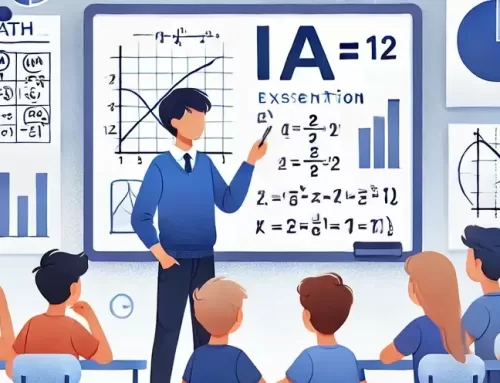IB 2022 exams are fast approaching. This means that many IB students around the world are already working double time to be able to study enough for the exams, comply with all the IB requirements, and meet all their deadlines. And one of such is the most important IB component that students need to get ready for – their Extended Essay (EE).
EE is a component of the International Baccalaureate Diploma Programme (IBDP) that students are required to write and submit before a given deadline. It is a structured essay containing no more than 4,000 words on a particular topic chosen by the student, which assesses their research ability and communication skills. The 4000-word essay is then accompanied by a reflection form that should contain a maximum of 500 words.
If you are currently in the process of writing your extended essay, or if you are an upcoming IB student who wishes to understand more about this IB requirement, this article is right for you. Here are some of the most important pieces of information you should know about the 2022 IB EE.
What should your extended essay include?
The extended essay is basically a mini-thesis that you write with the help of and under the supervision of your IB advisor. To begin your EE, you first need to decide on a research question as your topic, conduct independent research, and then write an essay on the findings of your research.
What should your extended essay include?
The extended essay is basically a mini-thesis that you write with the help of and under the supervision of your IB advisor. To begin your EE, you first need to decide on a research question as your topic, conduct independent research, and then write an essay on the findings of your research.
When writing your EE, you should always keep in mind that the IB requires the essays to be a formal academic piece. This means that you need to do outside research, cite sources properly, and follow the writing requirements set by the IB. Here are the parts that your IB EE should include:
- A page for your title
- A table of contents page
- Introduction
- Body of the essay
- Conclusion
- Bibliography and references
When it comes to formatting, your essay should be written in a readable 12-point font with double spacing. Using an easy-to-read font is important, so you can help the examiners read and evaluate your essay more easily. The IB also does not require any specific citation or referencing format, so you can pick whichever system you are comfortable with. Just make sure to follow your chosen citation style consistently throughout your essay.
What is the process for writing your extended essay?
The first step to writing your extended essay is choosing your research topic, which must fall into one of the six approved IB subject groups or categories: Mathematics, Sciences, Language and Acquisition, Studies in Language and Literature, Individuals and Societies, and the Arts.
Once you have already decided on your research topic, you need to come up with a topic proposal and meet with your IB advisor for approval and consultations. As of 2018, the IB already mandates that the EE supervision process of each student should include a “reflection process,” under which you are required to meet with your advisor in “reflection sessions” at least thrice.
According to the IB, the objective of the reflection meetings is to provide students with an opportunity to contemplate their engagement with the research process and to allow the advisors to offer feedback and evaluation of the students’ research process.
At the end of the EE process, a final reflection session called the “viva voce” will then take place. It is a quick 10- to 15-minute interview between the student and the advisor, which will help the latter write a report that will contribute to the student’s EE grade. The things usually covered in a viva voce are a plagiarism check, a reflection on your success and difficulty, and an overview of your learning during the EE process.
How to prepare a topic proposal for your extended essay?
As mentioned, coming up with a topic proposal is one of the first and most important steps in your EE writing process. Your topic proposal will basically provide an overview of what your essay will look like and how you will go about your research process. It is to be submitted to your advisor and a DP coordinator, who will read your proposal and decide on whether your chosen topic can be used for your extended essay.
Before handing in your topic proposal, it is important to consider every aspect of your research topic first to make sure you will obtain the approval of your academic advisor. Here are some of the questions you should ask when preparing your topic proposal:
- What is your research area, and why have you selected it?
- What is your research question all about?
- What is the importance of your topic?
- What background information do you know about your chosen topic?
- What research methods will you use, and what processes will you undergo?
- What primary and secondary sources are you planning to use for your research?
- Have you found any reading material for your topic already?
What are the deadlines for the EE submission?
Generally, the due dates for the submission of all extended essays this 2022 are on the 15th of March for the May exam session and on the 15th of September for the November session. However, the IB gives schools the freedom to set earlier due dates and internal deadlines for the various stages of producing the EE.
It is basically the schools’ responsibility to make sure all the works of their candidates are received by the IB on or before the submission date. To learn more about the EE submission deadlines, it is best to contact your IB school directly.
Conclusion
The extended essay is one of the most important components of IB that you should really prepare for. This requirement will not only demonstrate your research, communication, and self-management skills, but it will also reflect how much you have learned from your IB journey. To achieve a grade of D or higher on your IB EE, be sure to always follow the requirements and stick to the deadlines set by the IB and your school.
If the upcoming IB exams (particularly the hard ones like math and chemistry) are stressing you out, do not hesitate to seek the help of an IB maths tutor now. Here at QE, we have expert and experienced IGCSE and IB maths tutors in Singapore who will help you improve your study schedule and prepare better for the upcoming IB exams. To find out more about our reliable programs or tuition classes, get in touch with any of our educators and advisers today.




